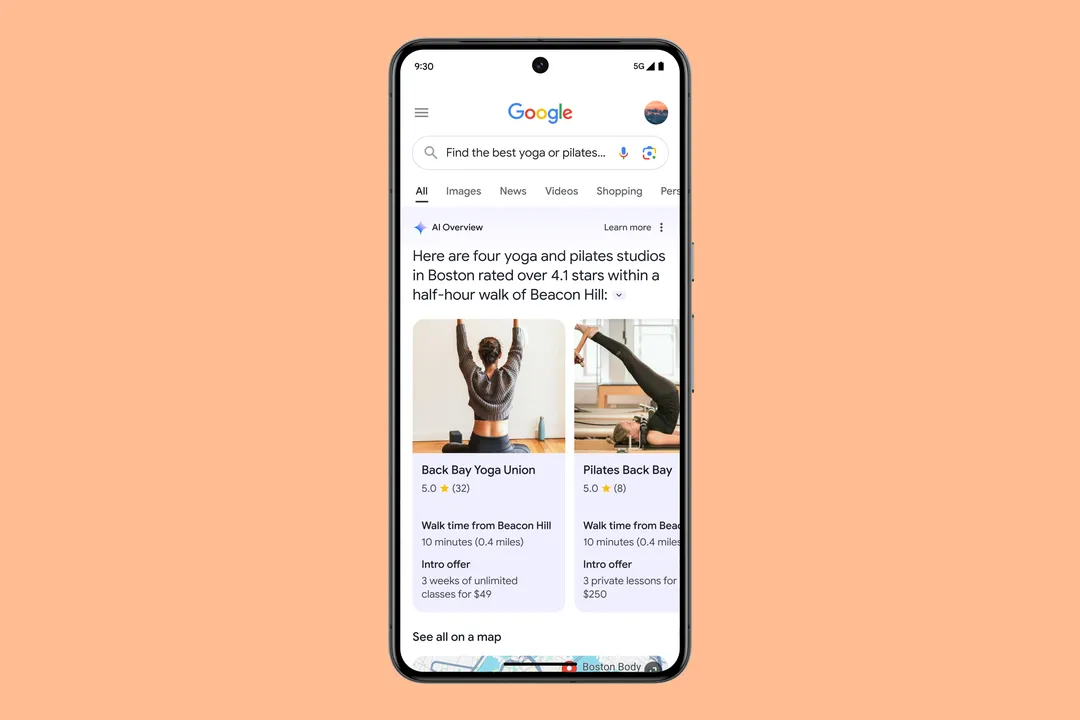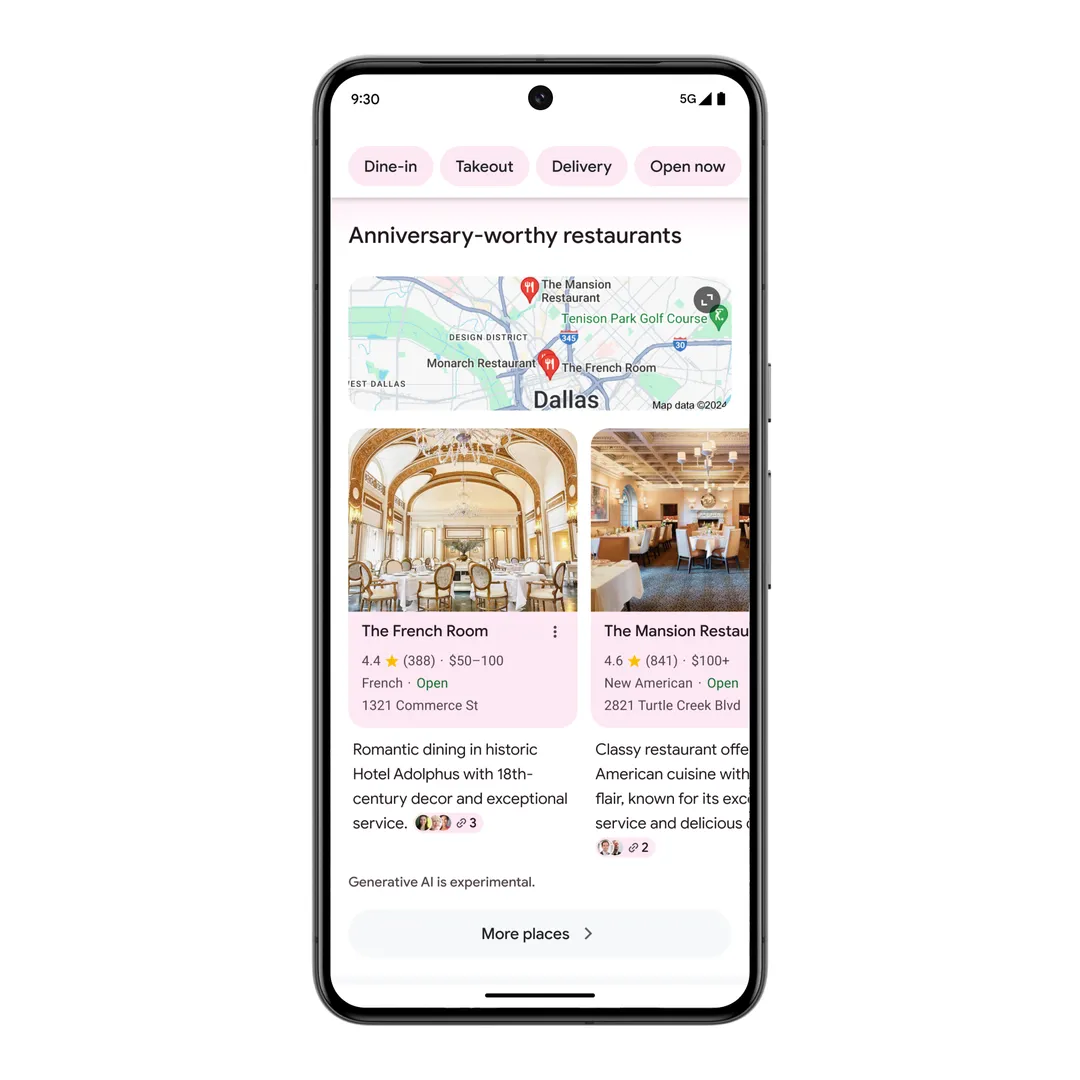We break down the key things to know about AI search engines, like how Google’s Gemini works, whether results are trustworthy, what new features will help you, and more.
Have questions about how artificial intelligence is transforming Google search? We’ll explain key details in simple terms on how AI features aim to provide more helpful, personalized results.
How AI is Transforming Google Search to Help You Find Answers Faster
Have you ever gotten frustrated trying to find what you’re looking for on Google? You type in a question and get pages of links to click through, but no simple answer. Well, that may change soon with Google’s latest updates powered by artificial intelligence (AI). Keep reading to learn how AI features like AI Overviews and automatic trip planning will totally reimagine Google Search!
Why Google Needs AI to Improve Web Search
For years, typing keywords into the Google search box has been the way to explore the internet. But finding high quality, relevant information can still take lots of time and effort. AI has the potential to change that by understanding language more like a human. For example, you could ask “What yoga studios near me offer deals for beginners?” rather than trying to match keywords.
Google’s goal is to use AI to make search:
- Easier: Getting useful information should take less effort.
- More helpful: It should better understand what you need.
- More visual: It could organize photos and videos for you too.
- More conversational: Like talking to an expert!
“What we see with generative AI is that Google can do more of the searching for you,” says Liz Reid, who heads Google Search.

Exciting New AI Features Coming Soon
Google recently unveiled their vision for an AI-powered search engine at a conference for developers. Their AI, called Gemini, will power new features being rolled out over 2022 and 2023 like:
AI Overviews – Get the Big Picture
Have you ever gotten lost in Wikipedia learning about something random? Well soon in Google Search, you may see an AI Overview summary giving you the key facts on a topic right at the top of results.
Almost like having your own personal expert assistant researcher! 🤓 These overviews will pull together key information in a few concise sentences so you quickly get the big picture.
AI Overviews aim to summarize topics to help you better understand the basics. But you can still click through links if you want to learn more details or perspectives.
Search By Capturing Images or Videos
How cool would it be to take a video of something that catches your eye, like an amazing dance move or local dish, and instantly search to learn more? Well with Google’s Lens tool and Gemini, that may soon be possible!
Just point your phone’s camera at something intriguing, capture a short video, and Gemini will give you search results about it. 🎥 No describing what you see needed. This visual voice search breakthrough could really change how we interact with Google!
Automatic Trip or Meal Planners
Have you ever spent forever researching the perfect weekend getaway or birthday dinner spot? Let Gemini be your personal travel agent 🧳 and head chef 👨🍳 ! Just type a query like “Plan Seattle trip for anniversary” and it will suggest custom itineraries. Or “Create fancy vegetarian meal plan for 4” and get recipes tailored exactly how you want.
Gemini pulls data from Google’s existing knowledge base as well as reads content from across the internet to make planning recommendations. The more info you provide upfront, the better ideas you’ll get back!
This automatic planning with Gemini will save SO much research time! No more scrolling through tons of irrelevant online articles and options.
How Does an AI Search Engine Actually Work?
So by now hopefully you’re excited about how much easier Gemini could make answering questions online! 😄 But you might be wondering – how exactly does an AI search engine figure stuff out anyway? What’s happening “behind the scenes”?
Well, Gemini is what’s called a natural language processing model. This means Google feeds Gemini millions and millions of web pages, news articles, reference texts, and more to read and analyze. Gemini uses this huge information database to:
- Understand words and how they connect
- Recognize different contexts and meanings
- Respond appropriately in conversational sentences
So while traditional Google search requires keywords and clicks between sites, Gemini approaches answering questions more like a thoughtful person – assessing all available information and explaining key details tailored to you. Pretty cool right?
Over time as Gemini processes more data, Google is able to enhance how their AI model thinks, reasons, and responds.🧠 Making it smarter and more helpful for providing answers!
“There’s a balance between creativity and factuality with any language model. We’re really going to skew it toward the factuality side.” – Liz Reid
The Future Looks Bright with AI Search Assistants!
It’s an exciting time looking ahead to how Gemini and other future AI features will continue evolving Google search to better understand us humans! 🤝 Understanding spoken questions, suggesting personalized recommendations, summarizing key information – Gemini aims to make finding answers a breeze.
And this is only the beginning! Google will keep expanding Gemini’s knowledge by processing more data so it answers queries even more accurately and helpfully. Plus they plan to integrate AI across all their products like Gmail, Calendar, Docs, etc to assist us in getting everyday tasks done easier.
The possibilities of an AI-powered search engine revolution truly seem endless. No more wasting time digging aimlessly for information or unable to ask the “right” keyword-loaded questions. Just open a browser or device and have a smart assistant ready to serve up whatever you need! 💡
What feature are you most excited to try on the new AI-enhanced Google? Let me know in the comments!
Got Questions About AI-Powered Search Engines? We’ve Got Answers!
Artificial intelligence is transforming Google search in exciting ways! As new features roll out, you probably have lots of questions. We’re breaking down the key things you should know about the future of AI search engines:
Is This AI Search Stuff Going to Take Over Completely?
Not exactly! Traditional keyword-based search still works great in many cases. AI features aim to enhance certain types of complex queries where you might give a conversational command or question. The goal is to understand language more like a human.
AI search works best for:
- Open-ended questions
- Creative exploration
- Visual searches
- Personalized planning
But for quick info like scores, dictionary definitions, or navigating to known sites, old-school search does the trick! The two will co-exist based on what makes sense.
“If you just want to navigate to a URL, you search for Walmart and you want to get to walmart.com. It’s not really beneficial to add AI.” – Liz Reid, Google Search Head
Source: Google I/O conference
How Does Google’s AI Actually Work to Understand Searches?
Google’s AI system Gemini uses an approach called natural language processing. This means it’s analyzed literal millions of websites, news reports, books, and other texts to:
- Recognize words and how to connect them
- Assess different meanings and contexts
- Generate thoughtful written responses
It uses all this data like a human would to better interpret questions and explanations when you search. Pretty neat!
Over time, Google keeps expanding the information Gemini can pull from to keep getting smarter. The more data the better when it comes to AI!
Source: Google Blog
Can We Trust What AI Tells Us in Search Results?
This is a key concern many have. Misinformation could run rampant! Google knows earning user trust is critical, so accuracy is the top priority with AI search.
The company says they will “skew toward factuality” to prevent false or harmful content in results. AI summaries aim to provide credible overviews sourced from reputable sites minus fluff or questionable claims.
AI search should supply factual, helpful guidance – almost like a wise library reference bot! But no model will be 100% perfect…so always think critically about what you read!
Source: The Verge
How Will These New AI Features Actually Help Me?
Imagine asking Google to suggest fun weekend activities nearby and instantly getting an organized list of top things to do! Or snapping a video of a dish you love and finding similar recipes in seconds.
Upcoming additions like AI Overviews quickly summarize topics to grasp basics faster. Visual search by just pointing your camera makes exploring so easy. And personalized automatic planning for travel or meals saves tons of time!
In our busy world, having an AI assistant handle the grunt work and distill answers down to what you need is a game changer! Things that wasted our time and energy manually can now be done with simple voice commands.
Source: Wired
I Heard AI Search Will Be More Visual? How So?
Yep, Google wants to enhance search to handle not just text but also process photos, videos, and even sounds! For example, their Google Lens app can now identify objects seen through your phone’s camera and instantly provide information.
Or as mentioned above, you could record a quick video of something cool like a dance routine or delicious meal and Gemini will serve up related search results without you needing to describe what you captured. Talk about handy!
They are also working on AI that can suggest or curate images and visual content to users based on interests. So the future holds a much more interactive, multimedia AI search experience!
Source: CNET
Won’t Our Privacy Be at Risk with All This Personal AI Data?
Privacy is always a concern when tech giants gain access to our personal data. Google claims they are developing responsible AI guided by ethical principles around transparency, fairness, and security.
They say the goal is to analyze broad trends from aggregate data to inform AI models, but not track individuals or access private details without disclosure and consent. So in theory, enhanced AI search should not heighten privacy risks compared to traditional search.
But only time will tell how user information is managed as capabilities grow. Keep an eye out that Google walks the privacy talk as AI progresses! Having clear policies and controls around data will be critical.
Source: Google AI Principles
Do I Need to Do Anything Differently to Use AI Search Tools?
Luckily, no! Google designed their AI to work seamlessly alongside their classic search without you needing any special skills. Just talk or type questions into the regular Google search bar and their algorithms figure out whether to engage an AI model or default results.
Over time, they aim to shift more and more queries to automated AI assistants capable of assessing what resources will best answer natural language questions. But the transition aims to happen behind the scenes without effort from you!
Source: Google Blog
Could AI Bias Ever Affect My Search Results?
Like any technology, the risk of bias exists if the AI is trained on skewed datasets not reflective of diversity. Google pledges to test algorithms extensively to address unfairness.
But no data or models can ever be 100% neutral. Unique backgrounds shape how we communicate and seek information. Google wants Gemini to grasp contexts from many communities, but gaps may happen.
If you ever notice strange AI search results that seem biased or irrelevant for you, reporting the issues to Google quickly can help algorithms continue improving! Getting broad user feedback will allow enhancements over time.
Source: Harvard Business Review
This All Seems Too Advanced! Will I Have to Become Some Kind of AI Expert?
Not at all! Google designed these innovations specifically so everyday users can benefit without any AI or tech expertise needed. Their goals are to simplify finding answers, not complicate things!
The beauty of AI search assistants is they handle the critical thinking so you don’t have to master complex skills. Just ask questions naturally as you would to an intelligent friend.
Over time, you may unconsciously start to adapt queries based on what data formats Gemini handles best. But you definitely don’t need to become an AI pro or learn coding to leverage these cool search innovations!
Source: Google Support
So in summary – yes, artificial intelligence is certainly transforming Google search. But exciting upgrades aim to help us, not replace us! They ultimately want to connect people to the meaningful content they seek as seamlessly as possible.
What questions do you still have about the future of AI-powered search engines? Ask in the comments and let’s chat!
We hope this beginner’s guide gave you a useful introduction to AI search capabilities! Let us know other questions you still have in the comments.






